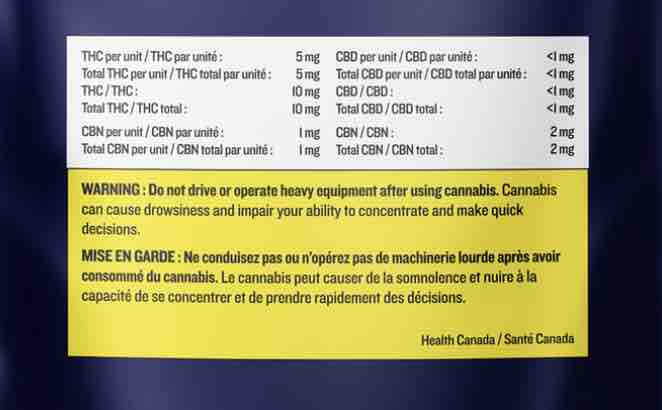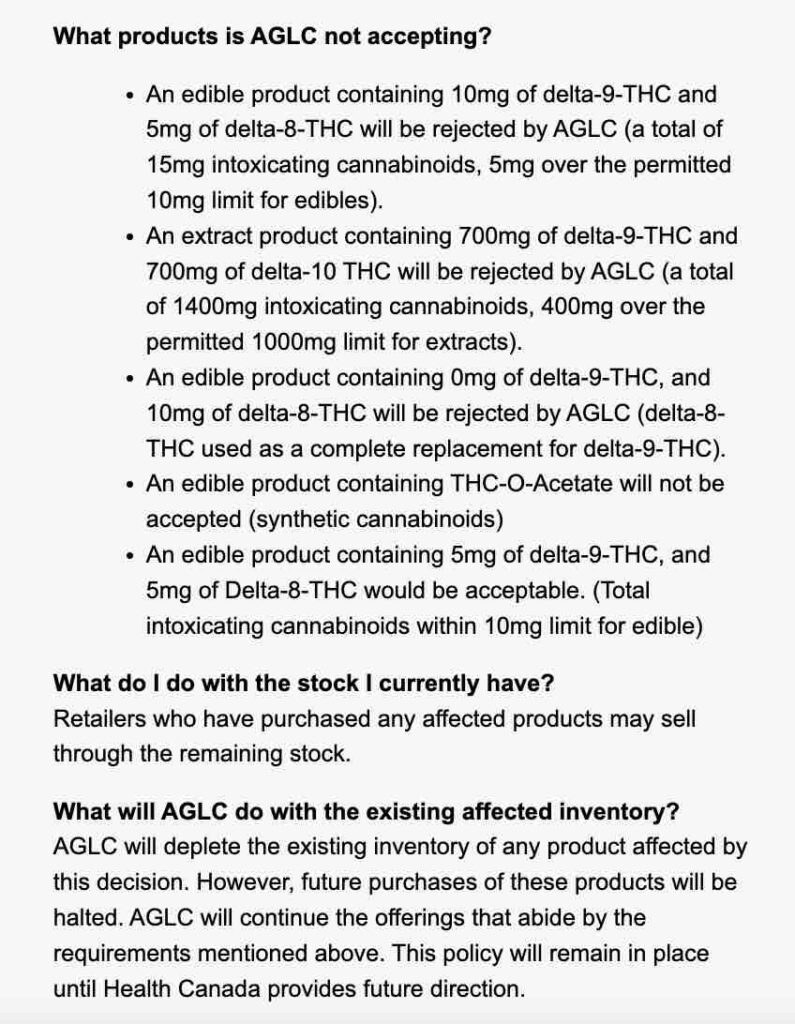While Alberta’s AGLC maintains it has considered CBN within the THC limits on cannabis products like edibles, concentrates, or topicals, based on guidance from Health Canada, four other provincial cannabis agencies say they have received no such guidance.
A representative with Health Canada does confirm it is currently considering the development of a guidance document for licence holders concerning what it considers intoxicating cannabinoids other than delta-9-THC. They have not made any changes to the federal regulations at this time.
The information comes in the wake of Alberta’s provincial distributor, the AGLC, reportedly telling some cannabis producers that it was including CBN within the federal 10mg THC limit for edibles. The AGLC says this was based on guidance from Health Canada, but points to a guidance document Health Canada published earlier this year that made no reference to CBN, only delta-8-THC and delta-10-THC.
While the AGLC tells StratCann that the regulatory change came into effect in February of this year, representatives from four other provincial cannabis agencies—New Brunswick’s Cannabis NB, BC’s LDB, Ontario’s OCS, and Quebec’s SQDC—tell StratCann that they have not received any guidance or directive from Health Canada regarding minor cannabinoids in general, nor CBN specifically.

Cannabis NB:
“No, Health Canada has not provided guidance to Cannabis NB in regard to minor cannabinoids. Cannabis NB will continue to sell products that meet Health Canada guidelines and regulations,” writes Angela Bosse, a communications specialist with Cannabis NB.
BC LDB:
“The BC Liquor Distribution Branch (LDB) has not received any recent direction from Health Canada regarding minor cannabinoids and the THC limit for edibles,” says Kate Bliney, a communications officer with the LDB, who also notes that in December 2022, the LDB advised licensed producers that it would not be registering or replenishing any products that contain delta-8-THC.
“At this time, the LDB has not issued any directives regarding other minor cannabinoids,” she adds.
The SQDC:
“The SQDC has not received any regulatory change or directive on regulatory application regarding minor cannabinoids,” writes Fabrice Giguère, communications advisor and spokesman for the SQDC, in an email to StratCann.
“We currently don’t have a policy on the matter. We have no reason to believe that any of our suppliers’ edible products are not compliant with both the federal and provincial regulations relating to the limit of THC. Hence, we’re not planning on delisting or removing any edible products.”
“In Québec, the maximum THC content allowed for ready-to-eat products is set at 10mg per package and 5mg per distinguishable unit contained within the package. As for ready-to-drink products, the maximum THC content allowed is set at 5mg per distinct unit.”
The OCS:
“The OCS is unaware of any formal guidance provided by Health Canada to Licensed Producers (LPs) of cannabis relating to suggested limits on intoxicating cannabinoids,” Daffyd Roderick, Senior Director, Communications and Social Responsibility at the OCS. “Should Health Canada issue formal guidance, the OCS will work with its LPs to understand the impacts and to support their compliance, as appropriate.”
While the AGLC told StratCann via email last week that the Ontario Cannabis Store also implemented the same requirements in regard to CBN based on Health Canada’s recommendations earlier this year, the OCS notes the only change they made was in reference to delta8-THC, not CBN or any other minor cannabinoids.
“In December 2022, OCS made a proactive decision to begin limiting the sale of products containing delta-8 THC in response to health and safety concerns raised in the United States. At that time, the OCS communicated with both LPs and licensed cannabis retailers to notify them of this change, which was made out of an abundance of caution while the industry waited for formal guidance and direction from Health Canada on whether amendments are required to the Cannabis Act and its Regulations to address intoxicating cannabinoids and other synthetic derivatives not explicitly captured within the framework.
“OCS remains committed to enabling a vibrant cannabis marketplace that offers adult consumers access to innovative, legal cannabis products, transitioning consumers away from unregulated sources and promoting social responsibility in connection with cannabis. Clear and specific regulatory guidance from Health Canada on the matter of intoxicating cannabinoids is critical to achieving these objectives.”
While the AGLC claims the change came into effect in February 2023, several producers tell StratCann that the AGLC continued to accept orders of products that contained CBN and fell outside of the province’s interpretation of these products by having more than 10mg THC, with CBN included in that total.
AGLC points to a document they sent out in February as being the notice in question, but that document referred only to delta-8-THC and delta-10-THC, not CBN or any other minor cannabinoids.
The AGLC also says the policy applies to any cannabis product “containing any combination of natural or synthetic intoxicating cannabinoids that exceed the THC limits set out for edibles and extract products in the Cannabis Regulations (10mg & 1000mg, respectively, per retail pack), including products with CBN.”
The 1,000mg THC limit would apply to concentrates and topicals.

The Alberta cannabis agency also maintains this rule about CBN was communicated to all LPs on Feb 15, 2023, when it says it requested LPs contact their respective AGLC category management specialists if they had any available products that were impacted by this policy.
“It recently came to our attention that there are certain SKUs which remain non-compliant with this requirement and so we have begun notifying affected LPs,” an AGLC comms person tells StratCann via email.
The AGLC says the list of cannabinoids it considers intoxicating is still changing and more could be added to the list in the future, which it says it is doing based on guidance from Health Canada.
“The cannabis plants make over 100 different minor/rare phytocannabinoids and there are also synthetic intoxicating cannabinoids created in lab,” continues AGLC’s communications team in an email to StratCann. “As such, the category of novel and minor intoxicating cannabinoids is still evolving. AGLC does not determine if a cannabinoid is intoxicating but instead follows guidance provided by Health Canada.
“The following are a few examples of intoxicating cannabinoids:
- Natural: delta-8-tetrahydrocannabinol (delta-8-THC), delta-10-tetrahydrocannabinol (delta-10-THC), cannabinol (CBN), tetrahydrocannabivarin (THCV), hexahydrocannabinol (HHC) etc.
- Synthetic cannabinoid derivatives (currently not allowed in Alberta): – tetrahydrocannabiphorol (THCP), tetrahydrocannabutol (THCB), tetrahydrocannabinol-O-acetate (THC-O) etc.
“As AGLC receives Health Canada guidance, it will continue to work with stakeholders to ensure LPs are aware of potential changes.”
A representative with Zelca, who was told by their category manager that one of their products was being immediately delisted, now says the AGLC has somewhat walked back their initial claim and will allow the sale of the in-stock Zelca product in question but will not be filling future orders.
Part of the confusion appears to be the inclusion of CBN as a “minor intoxicating cannabinoid” (MIC). While internal messaging shared with StratCann shows Health Canada is currently considering cannabinol (CBN) as a MIC, along with delta-8-THC, delta-10-THC, delta-6a-10a-THC, THC-O, HHC, THCV, THCP, and THCB, there is nothing official from Health Canada on the subject. However, the federal regulator has not issued any official regulator changes or guidelines regarding CBN to the provinces.
“Health Canada is also currently considering the development of a guidance document that would help licence holders understand the application of the Cannabis Act and its regulations on intoxicating cannabinoids other than delta-9-THC,” Anna Maddison, senior media relations advisor with Health Canada, tells StratCann via email.
“As with other topics and issues, Health Canada has regular discussions with licence holders and industry associations such as the Cannabis Council of Canada, National Cannabis Working Group of the Canadian Chamber of Commerce, and C-45 Quality Association. The topic of intoxicating cannabinoids other than delta-9-THC has been raised in these discussions.”
![]()


